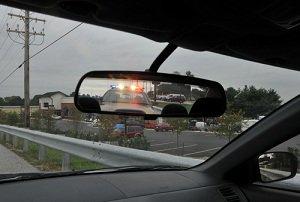Reasonable Mistakes, Unreasonable Consequences
 “A mistake of law is no excuse.” This proverbial saying suggests us that we cannot avoid responsibility for an action with the sole defense of “I didn’t know it was illegal.” Often, our common sense can tell us things that we should not be doing, whether it be stealing something or hurting someone. Lawyers are tasked with the responsibility of knowing the law and enforcing it in the criminal courts. Police officers enforce the law on the streets, and often require extensive knowledge of the law to conduct lawful arrests and searches as a result of traffic infractions. However, the United States Supreme Court spoke out regarding the fact that police officers are not lawyers, and granted North Carolina police officers leeway in conducting a search of a vehicle based on a mistake of law.
“A mistake of law is no excuse.” This proverbial saying suggests us that we cannot avoid responsibility for an action with the sole defense of “I didn’t know it was illegal.” Often, our common sense can tell us things that we should not be doing, whether it be stealing something or hurting someone. Lawyers are tasked with the responsibility of knowing the law and enforcing it in the criminal courts. Police officers enforce the law on the streets, and often require extensive knowledge of the law to conduct lawful arrests and searches as a result of traffic infractions. However, the United States Supreme Court spoke out regarding the fact that police officers are not lawyers, and granted North Carolina police officers leeway in conducting a search of a vehicle based on a mistake of law.
Search and Seizure
The reasons an officer can give for lawfully pulling someone over on the roadway varies by jurisdiction. In Illinois and many states, traffic offenses are typically labeled as “primary offenses” or “secondary offenses.” An officer may conduct a traffic stop based solely on a primary offense, such as using a handheld cellular device while driving. In other states, cell phone use while driving may be considered a secondary offense, in which an officer can only cite you or hold you accountable for the infraction if they pulled you over for something considered a primary infraction in that jurisdiction. For example, in a jurisdiction that has a seatbelt requirement as a primary offense, an officer could pull you over for failing to wear a seatbelt, but also note that you were on your cell phone and cite that as a secondary offense.
Once a driver has been pulled over for a traffic offense, the next steps can be complicated. One of the greatest questions in American jurisprudence surrounds reasonable search and seizures under the Fourth Amendment. Many controversial court cases have set parameters for determining when a vehicle can be searched, what the scope of consent is during a search, whether small compartments in a vehicle can be opened, or whether your passengers can be searched or even patted down.
Each of these scenarios depends on a certain set of circumstances present or not present during a traffic stop. Being subjected to a search may lead to police discovering unlawful items or may simply be embarrassing for you in front of passengers or passersby. You can, understandably, be under a lot of pressure to consent to a search when an officer is standing before you, even though you are not required to submit to a search of your vehicle under the law.
DuPage County Traffic Violation Attorneys
Search and seizure laws can be very complicated, and it is no wonder they have been a point of contention in U.S. courts for so long. Police officers, such as those discussed in the recent Supreme Court opinion, may inadvertently fail to observe search and seizure laws. Other times, officers and other personnel may abuse their power and conduct unlawful searches to obtain evidence to use against you. Understanding what your rights are during a traffic stop is incredibly important to preserve your privacy and dignity. If you think you may have been the victim of an improper traffic stop, your traffic or criminal charges may be dismissed in certain circumstances.
An unlawful search can lead to critical evidence the prosecution needs to bring a case being inadmissible in a court of law. If you or someone you know has suffered a search and seizure violation at a traffic stop, you need experienced DuPage County traffic attorneys on your side to help you navigate the Illinois court system. Call Kathryn L. Harry & Associates, P.C. at 630-472-9700 for a free initial consultation to learn more about your rights as a defendant.
 1200 Harger Road, Suite 830, Oak Brook, IL 60523
1200 Harger Road, Suite 830, Oak Brook, IL 60523







